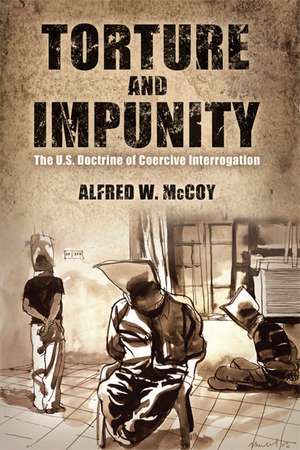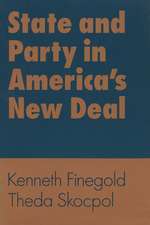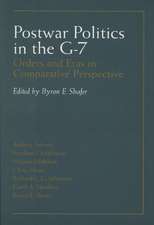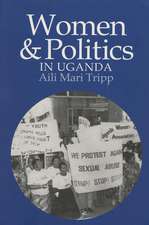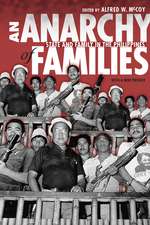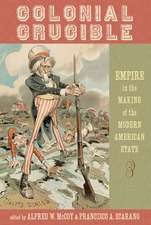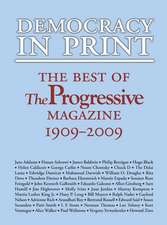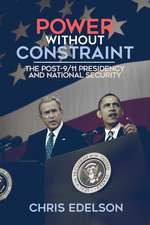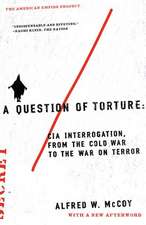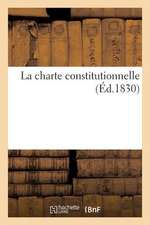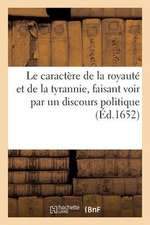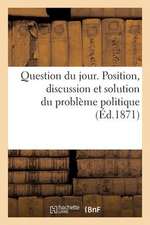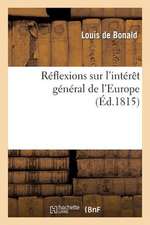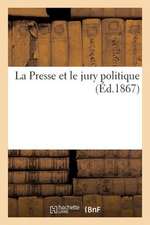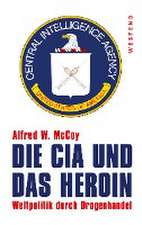Torture and Impunity: The U.S. Doctrine of Coercive Interrogation: Critical Human Rights
Autor Alfred W. McCoyen Limba Engleză Paperback – 23 aug 2012
Many Americans have condemned the “enhanced interrogation” techniques used in the War on Terror as a transgression of human rights. But the United States has done almost nothing to prosecute past abuses or prevent future violations. Tracing this knotty contradiction from the 1950s to the present, historian Alfred W. McCoy probes the political and cultural dynamics that have made impunity for torture a bipartisan policy of the U.S. government.
During the Cold War, McCoy argues, the U.S. Central Intelligence Agency covertly funded psychological experiments designed to weaken a subject’s resistance to interrogation. After the 9/11 terrorist attacks, the CIA revived these harsh methods, while U.S. media was flooded with seductive images that normalized torture for many Americans. Ten years later, the U.S. had failed to punish the perpetrators or the powerful who commanded them, and continued to exploit intelligence extracted under torture by surrogates from Somalia to Afghanistan. Although Washington has publicly distanced itself from torture, disturbing images from the prisons at Abu Ghraib and Guantanamo are seared into human memory, doing lasting damage to America’s moral authority as a world leader.
During the Cold War, McCoy argues, the U.S. Central Intelligence Agency covertly funded psychological experiments designed to weaken a subject’s resistance to interrogation. After the 9/11 terrorist attacks, the CIA revived these harsh methods, while U.S. media was flooded with seductive images that normalized torture for many Americans. Ten years later, the U.S. had failed to punish the perpetrators or the powerful who commanded them, and continued to exploit intelligence extracted under torture by surrogates from Somalia to Afghanistan. Although Washington has publicly distanced itself from torture, disturbing images from the prisons at Abu Ghraib and Guantanamo are seared into human memory, doing lasting damage to America’s moral authority as a world leader.
Din seria Critical Human Rights
-
 Preț: 167.81 lei
Preț: 167.81 lei -
 Preț: 171.14 lei
Preț: 171.14 lei -
 Preț: 257.44 lei
Preț: 257.44 lei -
 Preț: 234.39 lei
Preț: 234.39 lei -
 Preț: 159.02 lei
Preț: 159.02 lei -
 Preț: 233.54 lei
Preț: 233.54 lei -
 Preț: 189.99 lei
Preț: 189.99 lei -
 Preț: 311.92 lei
Preț: 311.92 lei -
 Preț: 254.11 lei
Preț: 254.11 lei -
 Preț: 225.80 lei
Preț: 225.80 lei -
 Preț: 258.01 lei
Preț: 258.01 lei - 23%
 Preț: 473.27 lei
Preț: 473.27 lei -
 Preț: 179.28 lei
Preț: 179.28 lei -
 Preț: 176.61 lei
Preț: 176.61 lei -
 Preț: 177.37 lei
Preț: 177.37 lei -
 Preț: 235.78 lei
Preț: 235.78 lei - 23%
 Preț: 452.84 lei
Preț: 452.84 lei -
 Preț: 221.81 lei
Preț: 221.81 lei -
 Preț: 213.29 lei
Preț: 213.29 lei -
 Preț: 237.55 lei
Preț: 237.55 lei -
 Preț: 231.15 lei
Preț: 231.15 lei - 23%
 Preț: 472.22 lei
Preț: 472.22 lei -
 Preț: 180.25 lei
Preț: 180.25 lei -
 Preț: 510.83 lei
Preț: 510.83 lei - 23%
 Preț: 474.60 lei
Preț: 474.60 lei - 23%
 Preț: 473.72 lei
Preț: 473.72 lei - 23%
 Preț: 590.00 lei
Preț: 590.00 lei - 23%
 Preț: 477.70 lei
Preț: 477.70 lei - 23%
 Preț: 472.37 lei
Preț: 472.37 lei - 11%
 Preț: 230.06 lei
Preț: 230.06 lei - 13%
 Preț: 200.36 lei
Preț: 200.36 lei - 19%
 Preț: 437.91 lei
Preț: 437.91 lei
Preț: 201.83 lei
Nou
Puncte Express: 303
Preț estimativ în valută:
38.62€ • 41.94$ • 32.44£
38.62€ • 41.94$ • 32.44£
Carte tipărită la comandă
Livrare economică 22 aprilie-06 mai
Preluare comenzi: 021 569.72.76
Specificații
ISBN-13: 9780299288549
ISBN-10: 0299288544
Pagini: 298
Ilustrații: 14 b-w illus.
Dimensiuni: 152 x 229 x 28 mm
Greutate: 0.59 kg
Ediția:1
Editura: University of Wisconsin Press
Colecția University of Wisconsin Press
Seria Critical Human Rights
ISBN-10: 0299288544
Pagini: 298
Ilustrații: 14 b-w illus.
Dimensiuni: 152 x 229 x 28 mm
Greutate: 0.59 kg
Ediția:1
Editura: University of Wisconsin Press
Colecția University of Wisconsin Press
Seria Critical Human Rights
Recenzii
"A fascinating and disturbing book, providing the most authoritative account of torture yet available and conforming to the best traditions of scholarship."—Richard Falk, Princeton University
“A masterful account of an appalling national drift toward accepting torture as part of our culture and polity.”—Alex Gibney, director, Oscar-winning documentary Taxi to the Dark Side
“This book gives the truth, the whole truth, and nothing but the truth, about the use of torture by the United States intelligence service.”—Jennifer Harbury, author of Truth, Torture, and the American Way
“McCoy, our finest thinker on the issue of torture, describes its legalization under Bush and the damage caused to morality, law, and our future by Obama's granting of impunity to the torturers. Readers will come away with the understanding that the United States' commitment to human rights was tested by 9/11—and it failed.”—Michael Ratner, president emeritus, Center for Constitutional Rights
“With this book, the leading historian of U.S. torture practices has done a great service for academics and the general public by deepening his genealogical account of psychological torture from the Cold War to the present. This is familiar ground for McCoy’s readers, but Torture and Impunity adds significantly to our understanding.”—Journal of American History
Notă biografică
Alfred W. McCoy is the J.R.W. Smail Professor of History at the University of Wisconsin–Madison. His many books include Policing America’s Empire and A Question of Torture.
Cuprins
Preface
1 The CIA's Pursuit of Psychological Torture
2 Science in Dachau's Shadow
3 Torture in the Crucible of Counterinsurgency
4 Theater State of Terror
5 The Seduction of Psychological Torture
6 The Outcast of Camp Echo
7 Psychological Torture and Public Forgetting
Notes
Index
1 The CIA's Pursuit of Psychological Torture
2 Science in Dachau's Shadow
3 Torture in the Crucible of Counterinsurgency
4 Theater State of Terror
5 The Seduction of Psychological Torture
6 The Outcast of Camp Echo
7 Psychological Torture and Public Forgetting
Notes
Index
Descriere
Many Americans have condemned the “enhanced interrogation” techniques used in the War on Terror as a transgression of human rights. But the United States has done almost nothing to prosecute past abuses or prevent future violations. Tracing this knotty contradiction from the 1950s to the present, historian Alfred W. McCoy probes the political and cultural dynamics that have made impunity for torture a bipartisan policy of the U.S. government.
During the Cold War, McCoy argues, the U.S. Central Intelligence Agency covertly funded psychological experiments designed to weaken a subject’s resistance to interrogation. After the 9/11 terrorist attacks, the CIA revived these harsh methods, while U.S. media was flooded with seductive images that normalized torture for many Americans. Ten years later, the U.S. had failed to punish the perpetrators or the powerful who commanded them, and continued to exploit intelligence extracted under torture by surrogates from Somalia to Afghanistan. Although Washington has publicly distanced itself from torture, disturbing images from the prisons at Abu Ghraib and Guantanamo are seared into human memory, doing lasting damage to America’s moral authority as a world leader.
During the Cold War, McCoy argues, the U.S. Central Intelligence Agency covertly funded psychological experiments designed to weaken a subject’s resistance to interrogation. After the 9/11 terrorist attacks, the CIA revived these harsh methods, while U.S. media was flooded with seductive images that normalized torture for many Americans. Ten years later, the U.S. had failed to punish the perpetrators or the powerful who commanded them, and continued to exploit intelligence extracted under torture by surrogates from Somalia to Afghanistan. Although Washington has publicly distanced itself from torture, disturbing images from the prisons at Abu Ghraib and Guantanamo are seared into human memory, doing lasting damage to America’s moral authority as a world leader.
